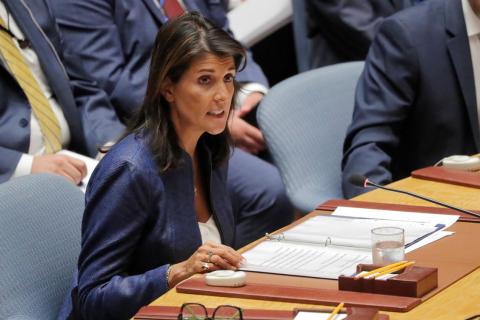Advertisement
U.S. envoy Haley questions Palestinian refugee numbers
WASHINGTON (Reuters) - U.S. Ambassador to the United Nations Nikki Haley on Tuesday appeared to question the world body's count of Palestinian refugees, the latest in a series of steps by the Trump administration challenging how relief aid is delivered to the Palestinians.
In remarks at the Foundation for Defense of Democracies, a Washington think tank often sympathetic to Israel, Haley agreed with a questioner who suggested that the U.N. Relief and Works Agency (UNWRA), which helps Palestinian refugees, overcounts their number.
The United States earlier this year cut its aid to UNWRA to $60 million from a promised $350 million for the year.
"We will be a donor if it (UNRWA) reforms what it does ... if they actually change the number of refugees to an accurate account, we will look back at partnering them," Haley said.
UNWRA says it provides services to about 5 million Palestinian refugees. Most are descendants from individuals who fled Palestine in the 1948 war that led to the creation of the state of Israel.
On another emotionally charged issue, Haley also questioned the "right of return" to Israel, claimed by the Palestinians as part of any eventual peace settlement.
Asked whether the right of return should be "off the table," Haley replied: "I do agree with that, and I think we have to look at this in terms of what's happening (with refugees) in Syria, what's happening in Venezuela."
"So I absolutely think we have to look at the right of return," she said.
U.S. President Donald Trump and his aides say they want to improve the Palestinians' plight, as well as start negotiations on an Israeli-Palestinian peace agreement.
But under Trump, Washington has taken a number of actions that have alienated the Palestinians, including the recognition of Jerusalem as Israel's capital.
The status of Jerusalem - home to sites holy to the Muslim, Jewish and Christian religions - is one of the biggest obstacles to any peace agreement between Israel and the Palestinians.
The United Nations says the status of the ancient city - whose eastern sector was captured by Israel in the 1967 Middle East war - can only be resolved by negotiations.
(Reporting by Warren Strobel and Lisa Lambert, editing by G Crosse)



















Add new comment